Unit 2 Morals and Virtues Discovering Useful Structures课件(共21张) 2024-2025学年高一英语人教版(2019)必修3
文档属性
| 名称 | Unit 2 Morals and Virtues Discovering Useful Structures课件(共21张) 2024-2025学年高一英语人教版(2019)必修3 | 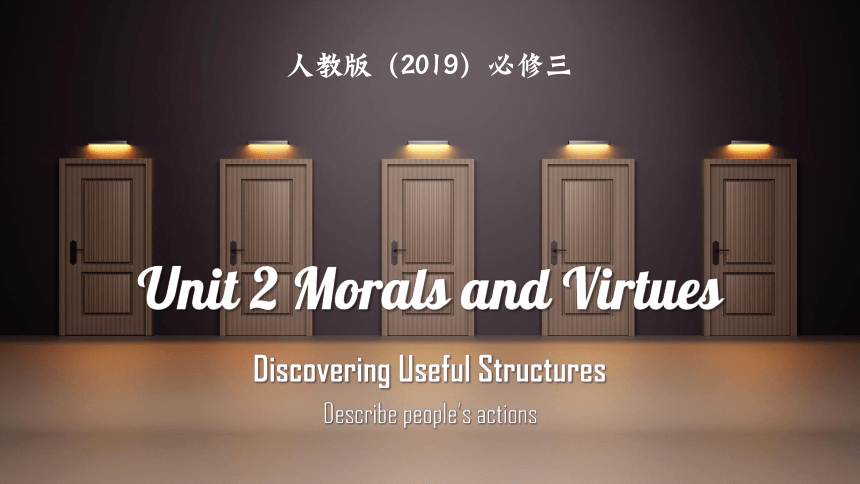 | |
| 格式 | pptx | ||
| 文件大小 | 25.8MB | ||
| 资源类型 | 教案 | ||
| 版本资源 | 人教版(2019) | ||
| 科目 | 英语 | ||
| 更新时间 | 2025-04-16 13:28:51 | ||
图片预览

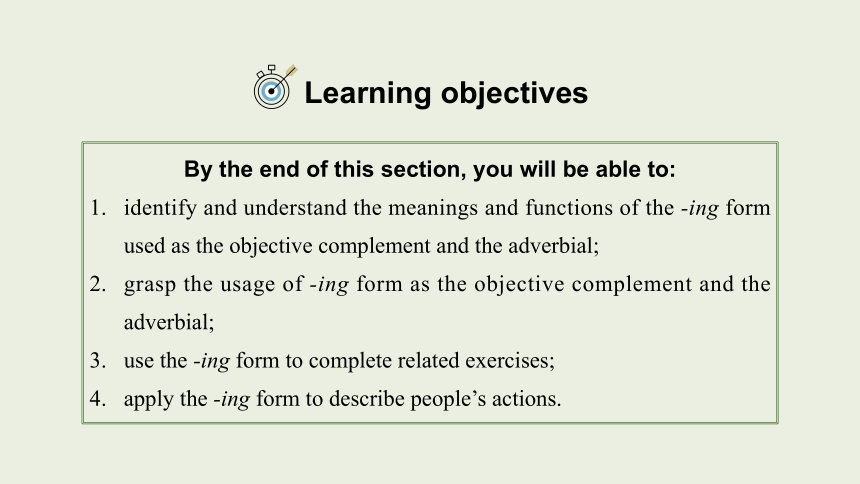
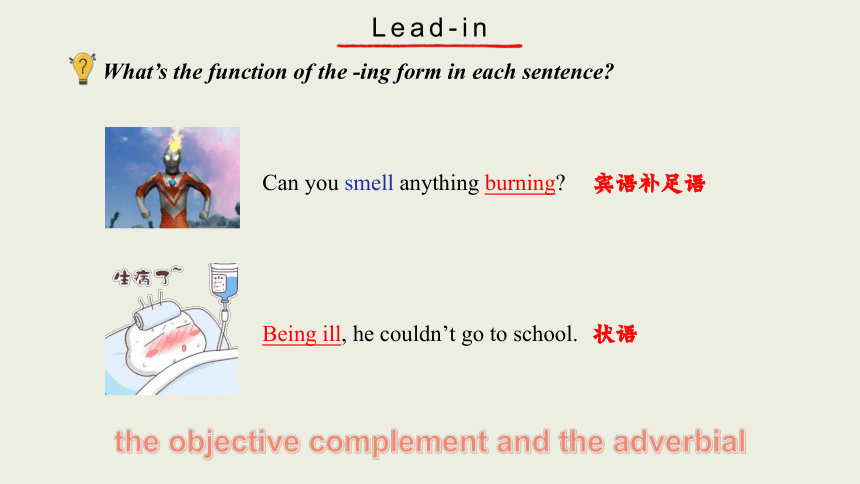
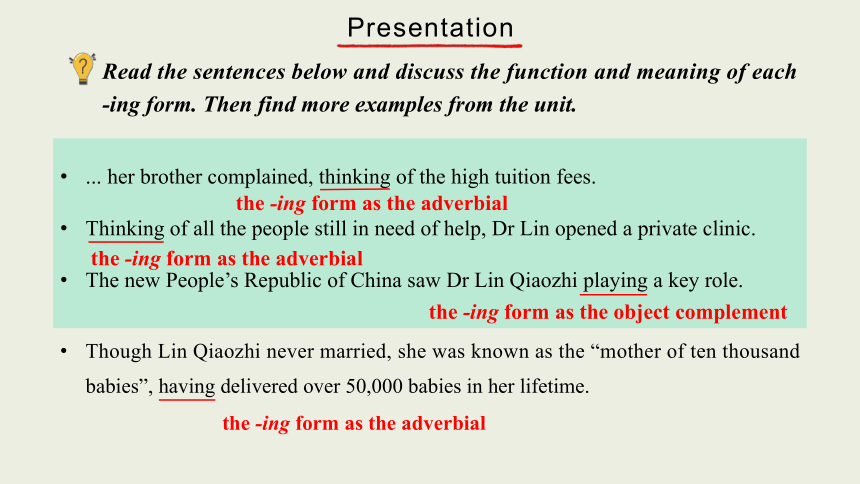
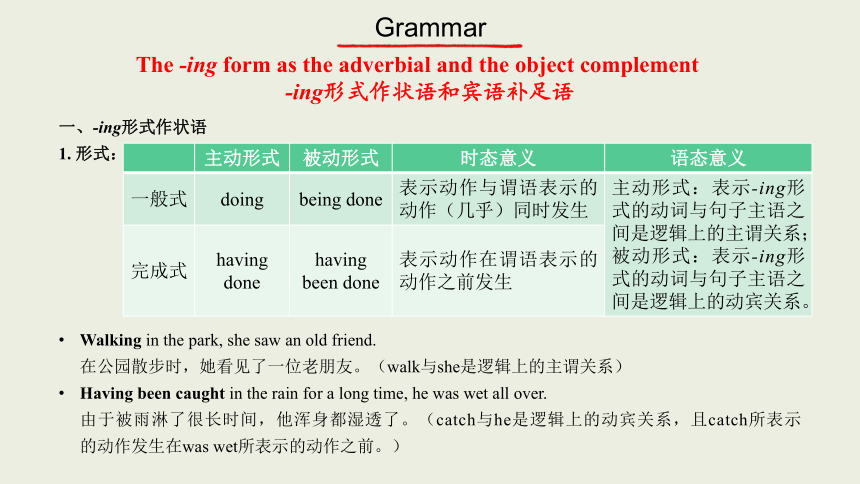
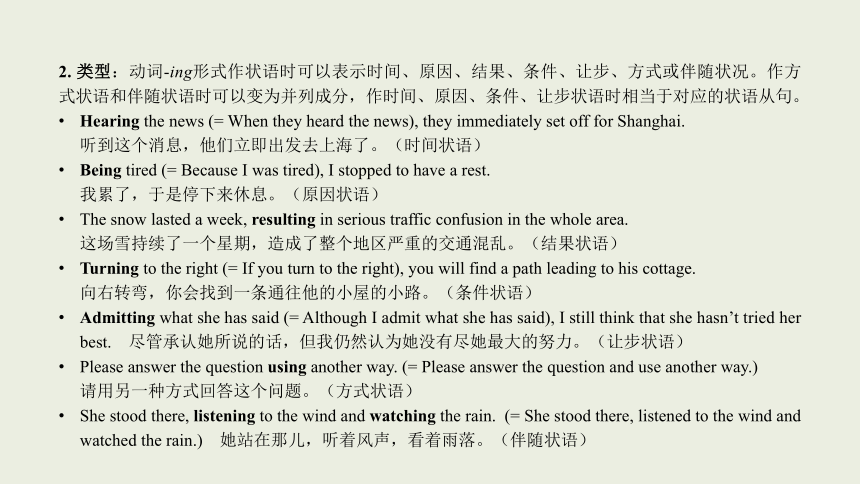
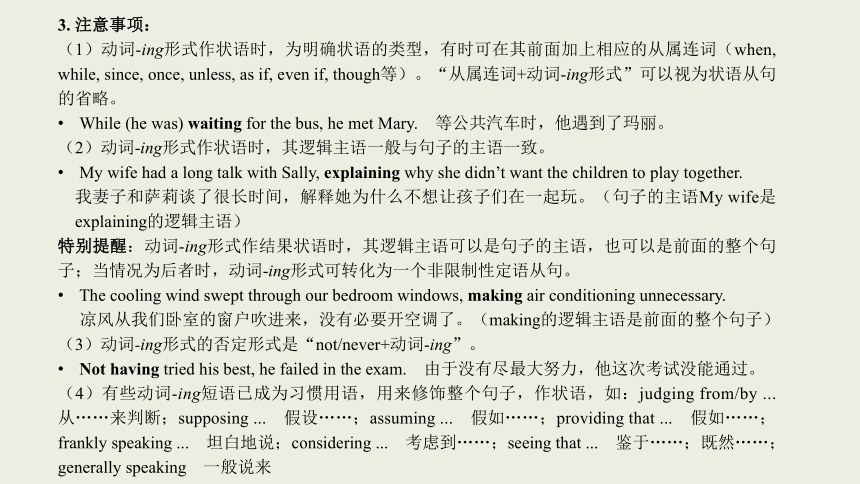
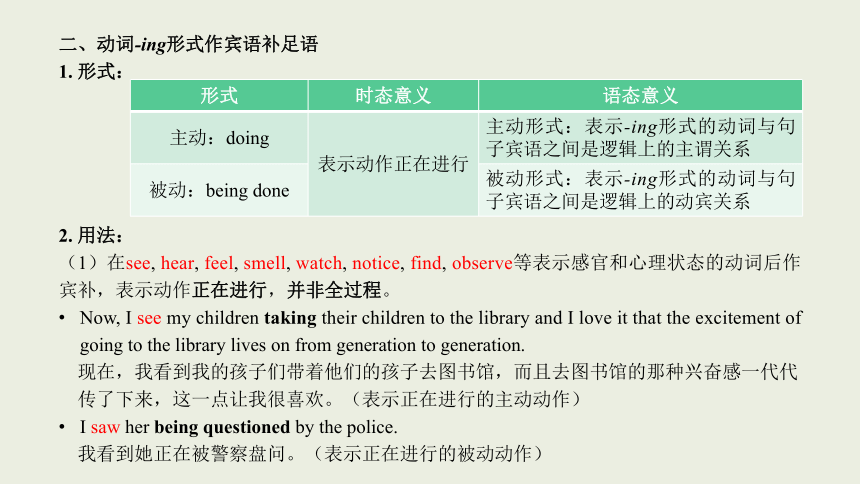
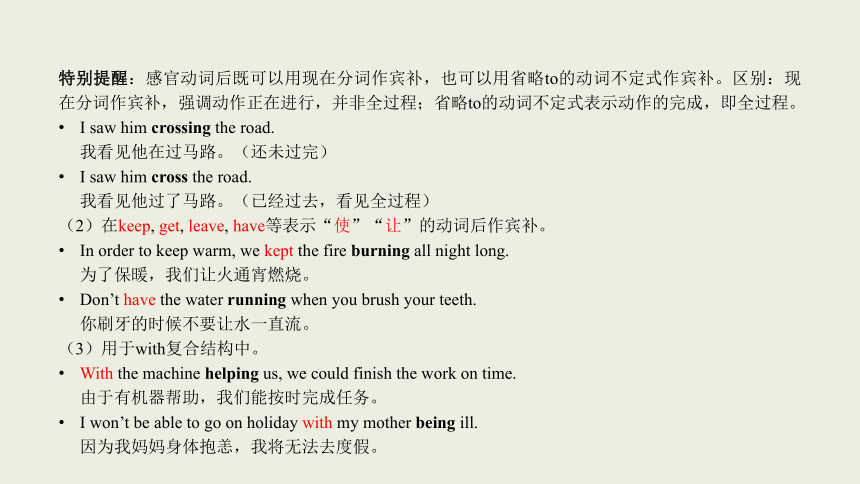
文档简介
(共21张PPT)
人教版(2019)必修三
Unit 2 Morals and Virtues
Discovering Useful Structures
Describe people’s actions
Learning objectives
By the end of this section, you will be able to:
identify and understand the meanings and functions of the -ing form used as the objective complement and the adverbial;
grasp the usage of -ing form as the objective complement and the adverbial;
use the -ing form to complete related exercises;
apply the -ing form to describe people’s actions.
the objective complement and the adverbial
Lead-in
What’s the function of the -ing form in each sentence
Being ill, he couldn’t go to school.
Can you smell anything burning
状语
宾语补足语
... her brother complained, thinking of the high tuition fees.
Thinking of all the people still in need of help, Dr Lin opened a private clinic.
The new People’s Republic of China saw Dr Lin Qiaozhi playing a key role.
the -ing form as the adverbial
the -ing form as the adverbial
the -ing form as the object complement
Though Lin Qiaozhi never married, she was known as the “mother of ten thousand babies”, having delivered over 50,000 babies in her lifetime.
the -ing form as the adverbial
Presentation
Read the sentences below and discuss the function and meaning of each
-ing form. Then find more examples from the unit.
一、-ing形式作状语
1. 形式:
Walking in the park, she saw an old friend.
在公园散步时,她看见了一位老朋友。(walk与she是逻辑上的主谓关系)
Having been caught in the rain for a long time, he was wet all over.
由于被雨淋了很长时间,他浑身都湿透了。(catch与he是逻辑上的动宾关系,且catch所表示
的动作发生在was wet所表示的动作之前。)
主动形式 被动形式 时态意义 语态意义
一般式 doing being done 表示动作与谓语表示的动作(几乎)同时发生 主动形式:表示-ing形式的动词与句子主语之间是逻辑上的主谓关系;
被动形式:表示-ing形式的动词与句子主语之间是逻辑上的动宾关系。
完成式 having done having been done 表示动作在谓语表示的动作之前发生 Grammar
The -ing form as the adverbial and the object complement
-ing形式作状语和宾语补足语
2. 类型:动词-ing形式作状语时可以表示时间、原因、结果、条件、让步、方式或伴随状况。作方式状语和伴随状语时可以变为并列成分,作时间、原因、条件、让步状语时相当于对应的状语从句。
Hearing the news (= When they heard the news), they immediately set off for Shanghai.
听到这个消息,他们立即出发去上海了。(时间状语)
Being tired (= Because I was tired), I stopped to have a rest.
我累了,于是停下来休息。(原因状语)
The snow lasted a week, resulting in serious traffic confusion in the whole area.
这场雪持续了一个星期,造成了整个地区严重的交通混乱。(结果状语)
Turning to the right (= If you turn to the right), you will find a path leading to his cottage.
向右转弯,你会找到一条通往他的小屋的小路。(条件状语)
Admitting what she has said (= Although I admit what she has said), I still think that she hasn’t tried her best. 尽管承认她所说的话,但我仍然认为她没有尽她最大的努力。(让步状语)
Please answer the question using another way. (= Please answer the question and use another way.)
请用另一种方式回答这个问题。(方式状语)
She stood there, listening to the wind and watching the rain. (= She stood there, listened to the wind and watched the rain.) 她站在那儿,听着风声,看着雨落。(伴随状语)
3. 注意事项:
(1)动词-ing形式作状语时,为明确状语的类型,有时可在其前面加上相应的从属连词(when, while, since, once, unless, as if, even if, though等)。“从属连词+动词-ing形式”可以视为状语从句的省略。
While (he was) waiting for the bus, he met Mary. 等公共汽车时,他遇到了玛丽。
(2)动词-ing形式作状语时,其逻辑主语一般与句子的主语一致。
My wife had a long talk with Sally, explaining why she didn’t want the children to play together.
我妻子和萨莉谈了很长时间,解释她为什么不想让孩子们在一起玩。(句子的主语My wife是
explaining的逻辑主语)
特别提醒:动词-ing形式作结果状语时,其逻辑主语可以是句子的主语,也可以是前面的整个句子;当情况为后者时,动词-ing形式可转化为一个非限制性定语从句。
The cooling wind swept through our bedroom windows, making air conditioning unnecessary.
凉风从我们卧室的窗户吹进来,没有必要开空调了。(making的逻辑主语是前面的整个句子)
(3)动词-ing形式的否定形式是“not/never+动词-ing”。
Not having tried his best, he failed in the exam. 由于没有尽最大努力,他这次考试没能通过。
(4)有些动词-ing短语已成为习惯用语,用来修饰整个句子,作状语,如:judging from/by ... 从……来判断;supposing ... 假设……;assuming ... 假如……;providing that ... 假如……;frankly speaking ... 坦白地说;considering ... 考虑到……;seeing that ... 鉴于……;既然……;generally speaking 一般说来
二、动词-ing形式作宾语补足语
1. 形式:
2. 用法:
(1)在see, hear, feel, smell, watch, notice, find, observe等表示感官和心理状态的动词后作宾补,表示动作正在进行,并非全过程。
Now, I see my children taking their children to the library and I love it that the excitement of going to the library lives on from generation to generation.
现在,我看到我的孩子们带着他们的孩子去图书馆,而且去图书馆的那种兴奋感一代代
传了下来,这一点让我很喜欢。(表示正在进行的主动动作)
I saw her being questioned by the police.
我看到她正在被警察盘问。(表示正在进行的被动动作)
形式 时态意义 语态意义
主动:doing 表示动作正在进行 主动形式:表示-ing形式的动词与句子宾语之间是逻辑上的主谓关系
被动:being done 被动形式:表示-ing形式的动词与句子宾语之间是逻辑上的动宾关系
特别提醒:感官动词后既可以用现在分词作宾补,也可以用省略to的动词不定式作宾补。区别:现在分词作宾补,强调动作正在进行,并非全过程;省略to的动词不定式表示动作的完成,即全过程。
I saw him crossing the road.
我看见他在过马路。(还未过完)
I saw him cross the road.
我看见他过了马路。(已经过去,看见全过程)
(2)在keep, get, leave, have等表示“使”“让”的动词后作宾补。
In order to keep warm, we kept the fire burning all night long.
为了保暖,我们让火通宵燃烧。
Don’t have the water running when you brush your teeth.
你刷牙的时候不要让水一直流。
(3)用于with复合结构中。
With the machine helping us, we could finish the work on time.
由于有机器帮助,我们能按时完成任务。
I won’t be able to go on holiday with my mother being ill.
因为我妈妈身体抱恙,我将无法去度假。
feel want face smile return worry hear knock
1. ________ that his wife had been injured in an accident, Mr Johnson hurried to the hospital.
2. During the operation, she sat in the waiting room for over an hour ________ about him.
3. I saw her whispering something into his ear, obviously not ________ to be heard.
4. He suddenly woke up at midnight when he heard someone _________ at his door.
5. _______ higher import and export costs, the company is looking for ways to survive.
6. __________ from the North Pole, the traveller wrote a book about his experience and had it
published the following year.
7. The child lay on her mother’s lap, _______ sweetly.
8. ________ hurt by the rejection, she bit her lip and quietly walked away.
Hearing
worrying
wanting
knocking
Facing
Returning
smiling
Feeling
Practice
Complete the sentences with the correct forms of the verbs in the box.
n. 事故;车祸;失事
n. 手术;企业;经营
vi. & vt. 悄声说;耳语;低语 n. 耳语(声);低语(声);传言;谣传
n. 子夜;午夜
n. 进口;进口商品 vt. 进口;输入;引进
n. 出口;出口商品 vt. 出口;输出;传播
n. (行星的)极;地级
n. (坐着时的)大腿部;(跑道等的)一圈
vt. & vi. 咬;叮;蜇 n. 咬;(咬下的)一口;咬伤
n. 嘴唇
1. A: You look really ____ (tire). You should go home and have a rest.
B: Yes, well, a five-hour operation is pretty _____ (tire).
2. A: Did you hear that Susan and Bob got married
B: Really That’s the most ________ (shock) news I have heard today.
3. A: Harry, you forgot to return my phone call last night!
B: Oh, I’m very sorry. I went to sleep ________ (listen) to music.
4. A: How can you sit inside ________ (play) games all day Isn’t there anything more important you can do
with your time
B: Come on, Mum. It’s a holiday.
5. A: The museum was __________ (interest), wasn’t it
B: It was great. I was quite _________ (interest) in those ancient pieces of jade.
6. A: Are you sure this is the man you saw that night
B: That’s right. From my window, I saw him _______ (come) into the building.
A: Did you hear a gunshot after that
B: No, but I heard people ________ (shout) downstairs.
A: What did you see when you came down
B: I saw an injured man _____ (lie) on the floor.
tired
tiring
shocking
listening
playing
interesting
interested
coming
shouting
lying
Complete the conversations using the correct forms of the words in brackets. (Workbook P68-1)
EXAMPLE
Because I did not know anyone, I sat alone in my seat for two hours. →
Not knowing anyone, I sat alone in my seat for two hours.
Although Joe was upset by the reporter’s words, he responded to his questions politely. →
Although upset by the reporter’s words, Joe responded to his questions
politely.
Rewrite the following sentences using the -ing form or the past participle as the adverbial. (Workbook P69-2)
1. As she was frightened by the noise, Amy turned on all the lights in the house.
2. While they were driving along the freeway, they noticed a kangaroo standing in the
middle of the road.
3. After we watched the movie for ten minutes, we felt so bored that we decided to leave.
4. As I came out of my house, I saw the volcano erupting (爆发).
5. After she turned fifteen, she became interested in travelling.
6. Because she didn’t want to be late, Sally ran to the subway station.
7. Tim was feeling tired, so he went to bed as soon as he got home.
8. After he gathered all his courage, he ran back into the burning house to rescue the child.
After watching the movie for ten minutes, we felt so bored that we decided to leave.
Coming out of my house, I saw the volcano erupting.
After turning fifteen, she became interested in travelling.
Not wanting to be late, Sally ran to the subway station.
Feeling tired, Tim went to bed as soon as he got home.
(After) Gathering all his courage, he ran back into the burning house to rescue the child.
Frightened by the noise, Amy turned on all the lights in the house.
While driving along the freeway, they noticed a kangaroo standing in the middle of the road.
Henry Norman Bethune was a Canadian doctor with a very creative mind and a determination to help people. As a small boy, he became very interested in medicine and decided to become a doctor. After he graduated from medical college in 1916, Bethune worked as a doctor in England, the US, and Canada. He reinvented or redesigned over 10 medical instruments to make them more useful. In 1938, Bethune left for China, after he heard that many people were dying in the war. Despite the difficult situation, Dr Bethune did whatever he could to assist the Chinese people. He helped to organise hospitals, taught doctors and nurses, and showed people how to give first aid. Sadly, Dr Bethune passed away in November the following year and was buried in Shijiazhuang. After Dr Bethune’s death, Chairman Mao Zedong wrote an article in memory of him, in which he praised Dr Bethune as a hero to be remembered in China.
deciding to become a doctor
after hearing that many people were dying in the war
praising Dr Bethune as a hero to be remembered in China
Read the following story and rewrite the underlined parts using the -ing form.
亨利·诺曼·白求恩
vt. 帮助;援助
急救
去世
n. 主席;主持人;董事长
作为对……的纪念
Complete the passage using the -ing form or the past participle of the verbs in the box. (Workbook P69-3)
hold get walk hear sing excite dance admire
After __________ that I was going to be my aunt’s bridesmaid, I felt so __________ that I didn’t sleep very well the night before her wedding day. Although I was tired, I didn’t mind __________ up early the next morning to go to my aunt’s house to get dressed up. I put on my blue dress and my aunt, of course, wore a white silk dress. When my aunt finally appeared at the back of the church, __________ a bunch of flowers, everybody looked at her with __________ smiles. After the wedding, I left the church __________ slowly behind my aunt and her husband. In the evening, we had a celebration party. Everybody was very happy, __________ and __________ until midnight.
hearing
excited
getting
holding
admiring
walking
singing
dancing
Production
Watch five minutes of a cartoon, a sports event, a documentary, or a film and take notes on what happened. Then write a paragraph describing the actions of the characters. Use the -ing form in your description. (Workbook P69-4)
I saw her whispering something into his ear, obviously not wanting to be heard. (P18)
我看见她对他耳语了几句,显然不想被人听见。
whisper / w sp (r)/ vi. & vt. 悄声说;耳语;低语
n. 耳语(声);低语(声);传言;谣传
搭配
whisper (sth) in/into sb’s ear 在某人耳边低声说(某事)
whisper about sth 低声说某事
whisper (sth) to sb 对某人低声说(某事)
in a whisper / in whispers 低声地
例句
Nervously facing challenges, I know I will whisper to myself the two simple words “Be yourself”. 当紧张地面对挑战时,我知道我将对自己低语那两个简单的词“Be yourself”。
Language points
1
Despite the difficult situation, Dr Bethune did whatever he could to assist the Chinese people. (P18) 尽管形势严峻,白求恩大夫还是尽其所能地帮助中国人民。
assist / s st/ vt. 帮助;援助
搭配
assist sb to do sth 帮助某人做某事
assist sb in (doing) sth 帮助某人(做)某事
assist sb with sth 在某事上帮助某人
拓展
assistant n. [C]助手,助理;售货员 adj. 助理的
assistance n. [U]帮助,援助,支持
come to one’s assistance 去帮助某人
with the assistance of 在……的帮助下
2
例句
The young nurse was very nervous when she assisted the doctor to perform an operation for the first time.
这位年轻的护士首次协助医生做手术时,心里非常紧张。
I swam to Dad quickly and assisted him in climbing onto the boat.
我迅速游向父亲,并协助他爬到船上。
We’re looking for people who would be willing to assist us with the group’s work.
我们正在寻找愿意帮助我们做小组工作的人。
With the assistance of the volunteers, he finally met his daughter who had been missing for 30 years.
在志愿者的帮助下,他终于见到了失踪30年的女儿。
After Dr Bethune’s death, Chairman Mao Zedong wrote an article in memory of him,
in which he praised Dr Bethune as a hero to be remembered in China. (P18)
in memory of 作为对……的纪念
例句
The Dragon Boat Festival is held in memory of the famous poet Qu Yuan.
龙舟节的举办是为了纪念著名诗人屈原。
拓展
in praise of 称赞,歌颂 in celebration of ... 庆祝…… in search of 寻找
in favour of 支持,赞同 in charge of 负责;管理 in need of 需要
in control of 控制 in aid of ... 为了帮助…… in support of 支持
in honour of ... 为向……表示敬意
3
Homework
Summarize the usage of the -ing form as the objective complement and the adverbial.
Continue to complete your writing and share your writing with your partners.
人教版(2019)必修三
Unit 2 Morals and Virtues
Discovering Useful Structures
Describe people’s actions
Learning objectives
By the end of this section, you will be able to:
identify and understand the meanings and functions of the -ing form used as the objective complement and the adverbial;
grasp the usage of -ing form as the objective complement and the adverbial;
use the -ing form to complete related exercises;
apply the -ing form to describe people’s actions.
the objective complement and the adverbial
Lead-in
What’s the function of the -ing form in each sentence
Being ill, he couldn’t go to school.
Can you smell anything burning
状语
宾语补足语
... her brother complained, thinking of the high tuition fees.
Thinking of all the people still in need of help, Dr Lin opened a private clinic.
The new People’s Republic of China saw Dr Lin Qiaozhi playing a key role.
the -ing form as the adverbial
the -ing form as the adverbial
the -ing form as the object complement
Though Lin Qiaozhi never married, she was known as the “mother of ten thousand babies”, having delivered over 50,000 babies in her lifetime.
the -ing form as the adverbial
Presentation
Read the sentences below and discuss the function and meaning of each
-ing form. Then find more examples from the unit.
一、-ing形式作状语
1. 形式:
Walking in the park, she saw an old friend.
在公园散步时,她看见了一位老朋友。(walk与she是逻辑上的主谓关系)
Having been caught in the rain for a long time, he was wet all over.
由于被雨淋了很长时间,他浑身都湿透了。(catch与he是逻辑上的动宾关系,且catch所表示
的动作发生在was wet所表示的动作之前。)
主动形式 被动形式 时态意义 语态意义
一般式 doing being done 表示动作与谓语表示的动作(几乎)同时发生 主动形式:表示-ing形式的动词与句子主语之间是逻辑上的主谓关系;
被动形式:表示-ing形式的动词与句子主语之间是逻辑上的动宾关系。
完成式 having done having been done 表示动作在谓语表示的动作之前发生 Grammar
The -ing form as the adverbial and the object complement
-ing形式作状语和宾语补足语
2. 类型:动词-ing形式作状语时可以表示时间、原因、结果、条件、让步、方式或伴随状况。作方式状语和伴随状语时可以变为并列成分,作时间、原因、条件、让步状语时相当于对应的状语从句。
Hearing the news (= When they heard the news), they immediately set off for Shanghai.
听到这个消息,他们立即出发去上海了。(时间状语)
Being tired (= Because I was tired), I stopped to have a rest.
我累了,于是停下来休息。(原因状语)
The snow lasted a week, resulting in serious traffic confusion in the whole area.
这场雪持续了一个星期,造成了整个地区严重的交通混乱。(结果状语)
Turning to the right (= If you turn to the right), you will find a path leading to his cottage.
向右转弯,你会找到一条通往他的小屋的小路。(条件状语)
Admitting what she has said (= Although I admit what she has said), I still think that she hasn’t tried her best. 尽管承认她所说的话,但我仍然认为她没有尽她最大的努力。(让步状语)
Please answer the question using another way. (= Please answer the question and use another way.)
请用另一种方式回答这个问题。(方式状语)
She stood there, listening to the wind and watching the rain. (= She stood there, listened to the wind and watched the rain.) 她站在那儿,听着风声,看着雨落。(伴随状语)
3. 注意事项:
(1)动词-ing形式作状语时,为明确状语的类型,有时可在其前面加上相应的从属连词(when, while, since, once, unless, as if, even if, though等)。“从属连词+动词-ing形式”可以视为状语从句的省略。
While (he was) waiting for the bus, he met Mary. 等公共汽车时,他遇到了玛丽。
(2)动词-ing形式作状语时,其逻辑主语一般与句子的主语一致。
My wife had a long talk with Sally, explaining why she didn’t want the children to play together.
我妻子和萨莉谈了很长时间,解释她为什么不想让孩子们在一起玩。(句子的主语My wife是
explaining的逻辑主语)
特别提醒:动词-ing形式作结果状语时,其逻辑主语可以是句子的主语,也可以是前面的整个句子;当情况为后者时,动词-ing形式可转化为一个非限制性定语从句。
The cooling wind swept through our bedroom windows, making air conditioning unnecessary.
凉风从我们卧室的窗户吹进来,没有必要开空调了。(making的逻辑主语是前面的整个句子)
(3)动词-ing形式的否定形式是“not/never+动词-ing”。
Not having tried his best, he failed in the exam. 由于没有尽最大努力,他这次考试没能通过。
(4)有些动词-ing短语已成为习惯用语,用来修饰整个句子,作状语,如:judging from/by ... 从……来判断;supposing ... 假设……;assuming ... 假如……;providing that ... 假如……;frankly speaking ... 坦白地说;considering ... 考虑到……;seeing that ... 鉴于……;既然……;generally speaking 一般说来
二、动词-ing形式作宾语补足语
1. 形式:
2. 用法:
(1)在see, hear, feel, smell, watch, notice, find, observe等表示感官和心理状态的动词后作宾补,表示动作正在进行,并非全过程。
Now, I see my children taking their children to the library and I love it that the excitement of going to the library lives on from generation to generation.
现在,我看到我的孩子们带着他们的孩子去图书馆,而且去图书馆的那种兴奋感一代代
传了下来,这一点让我很喜欢。(表示正在进行的主动动作)
I saw her being questioned by the police.
我看到她正在被警察盘问。(表示正在进行的被动动作)
形式 时态意义 语态意义
主动:doing 表示动作正在进行 主动形式:表示-ing形式的动词与句子宾语之间是逻辑上的主谓关系
被动:being done 被动形式:表示-ing形式的动词与句子宾语之间是逻辑上的动宾关系
特别提醒:感官动词后既可以用现在分词作宾补,也可以用省略to的动词不定式作宾补。区别:现在分词作宾补,强调动作正在进行,并非全过程;省略to的动词不定式表示动作的完成,即全过程。
I saw him crossing the road.
我看见他在过马路。(还未过完)
I saw him cross the road.
我看见他过了马路。(已经过去,看见全过程)
(2)在keep, get, leave, have等表示“使”“让”的动词后作宾补。
In order to keep warm, we kept the fire burning all night long.
为了保暖,我们让火通宵燃烧。
Don’t have the water running when you brush your teeth.
你刷牙的时候不要让水一直流。
(3)用于with复合结构中。
With the machine helping us, we could finish the work on time.
由于有机器帮助,我们能按时完成任务。
I won’t be able to go on holiday with my mother being ill.
因为我妈妈身体抱恙,我将无法去度假。
feel want face smile return worry hear knock
1. ________ that his wife had been injured in an accident, Mr Johnson hurried to the hospital.
2. During the operation, she sat in the waiting room for over an hour ________ about him.
3. I saw her whispering something into his ear, obviously not ________ to be heard.
4. He suddenly woke up at midnight when he heard someone _________ at his door.
5. _______ higher import and export costs, the company is looking for ways to survive.
6. __________ from the North Pole, the traveller wrote a book about his experience and had it
published the following year.
7. The child lay on her mother’s lap, _______ sweetly.
8. ________ hurt by the rejection, she bit her lip and quietly walked away.
Hearing
worrying
wanting
knocking
Facing
Returning
smiling
Feeling
Practice
Complete the sentences with the correct forms of the verbs in the box.
n. 事故;车祸;失事
n. 手术;企业;经营
vi. & vt. 悄声说;耳语;低语 n. 耳语(声);低语(声);传言;谣传
n. 子夜;午夜
n. 进口;进口商品 vt. 进口;输入;引进
n. 出口;出口商品 vt. 出口;输出;传播
n. (行星的)极;地级
n. (坐着时的)大腿部;(跑道等的)一圈
vt. & vi. 咬;叮;蜇 n. 咬;(咬下的)一口;咬伤
n. 嘴唇
1. A: You look really ____ (tire). You should go home and have a rest.
B: Yes, well, a five-hour operation is pretty _____ (tire).
2. A: Did you hear that Susan and Bob got married
B: Really That’s the most ________ (shock) news I have heard today.
3. A: Harry, you forgot to return my phone call last night!
B: Oh, I’m very sorry. I went to sleep ________ (listen) to music.
4. A: How can you sit inside ________ (play) games all day Isn’t there anything more important you can do
with your time
B: Come on, Mum. It’s a holiday.
5. A: The museum was __________ (interest), wasn’t it
B: It was great. I was quite _________ (interest) in those ancient pieces of jade.
6. A: Are you sure this is the man you saw that night
B: That’s right. From my window, I saw him _______ (come) into the building.
A: Did you hear a gunshot after that
B: No, but I heard people ________ (shout) downstairs.
A: What did you see when you came down
B: I saw an injured man _____ (lie) on the floor.
tired
tiring
shocking
listening
playing
interesting
interested
coming
shouting
lying
Complete the conversations using the correct forms of the words in brackets. (Workbook P68-1)
EXAMPLE
Because I did not know anyone, I sat alone in my seat for two hours. →
Not knowing anyone, I sat alone in my seat for two hours.
Although Joe was upset by the reporter’s words, he responded to his questions politely. →
Although upset by the reporter’s words, Joe responded to his questions
politely.
Rewrite the following sentences using the -ing form or the past participle as the adverbial. (Workbook P69-2)
1. As she was frightened by the noise, Amy turned on all the lights in the house.
2. While they were driving along the freeway, they noticed a kangaroo standing in the
middle of the road.
3. After we watched the movie for ten minutes, we felt so bored that we decided to leave.
4. As I came out of my house, I saw the volcano erupting (爆发).
5. After she turned fifteen, she became interested in travelling.
6. Because she didn’t want to be late, Sally ran to the subway station.
7. Tim was feeling tired, so he went to bed as soon as he got home.
8. After he gathered all his courage, he ran back into the burning house to rescue the child.
After watching the movie for ten minutes, we felt so bored that we decided to leave.
Coming out of my house, I saw the volcano erupting.
After turning fifteen, she became interested in travelling.
Not wanting to be late, Sally ran to the subway station.
Feeling tired, Tim went to bed as soon as he got home.
(After) Gathering all his courage, he ran back into the burning house to rescue the child.
Frightened by the noise, Amy turned on all the lights in the house.
While driving along the freeway, they noticed a kangaroo standing in the middle of the road.
Henry Norman Bethune was a Canadian doctor with a very creative mind and a determination to help people. As a small boy, he became very interested in medicine and decided to become a doctor. After he graduated from medical college in 1916, Bethune worked as a doctor in England, the US, and Canada. He reinvented or redesigned over 10 medical instruments to make them more useful. In 1938, Bethune left for China, after he heard that many people were dying in the war. Despite the difficult situation, Dr Bethune did whatever he could to assist the Chinese people. He helped to organise hospitals, taught doctors and nurses, and showed people how to give first aid. Sadly, Dr Bethune passed away in November the following year and was buried in Shijiazhuang. After Dr Bethune’s death, Chairman Mao Zedong wrote an article in memory of him, in which he praised Dr Bethune as a hero to be remembered in China.
deciding to become a doctor
after hearing that many people were dying in the war
praising Dr Bethune as a hero to be remembered in China
Read the following story and rewrite the underlined parts using the -ing form.
亨利·诺曼·白求恩
vt. 帮助;援助
急救
去世
n. 主席;主持人;董事长
作为对……的纪念
Complete the passage using the -ing form or the past participle of the verbs in the box. (Workbook P69-3)
hold get walk hear sing excite dance admire
After __________ that I was going to be my aunt’s bridesmaid, I felt so __________ that I didn’t sleep very well the night before her wedding day. Although I was tired, I didn’t mind __________ up early the next morning to go to my aunt’s house to get dressed up. I put on my blue dress and my aunt, of course, wore a white silk dress. When my aunt finally appeared at the back of the church, __________ a bunch of flowers, everybody looked at her with __________ smiles. After the wedding, I left the church __________ slowly behind my aunt and her husband. In the evening, we had a celebration party. Everybody was very happy, __________ and __________ until midnight.
hearing
excited
getting
holding
admiring
walking
singing
dancing
Production
Watch five minutes of a cartoon, a sports event, a documentary, or a film and take notes on what happened. Then write a paragraph describing the actions of the characters. Use the -ing form in your description. (Workbook P69-4)
I saw her whispering something into his ear, obviously not wanting to be heard. (P18)
我看见她对他耳语了几句,显然不想被人听见。
whisper / w sp (r)/ vi. & vt. 悄声说;耳语;低语
n. 耳语(声);低语(声);传言;谣传
搭配
whisper (sth) in/into sb’s ear 在某人耳边低声说(某事)
whisper about sth 低声说某事
whisper (sth) to sb 对某人低声说(某事)
in a whisper / in whispers 低声地
例句
Nervously facing challenges, I know I will whisper to myself the two simple words “Be yourself”. 当紧张地面对挑战时,我知道我将对自己低语那两个简单的词“Be yourself”。
Language points
1
Despite the difficult situation, Dr Bethune did whatever he could to assist the Chinese people. (P18) 尽管形势严峻,白求恩大夫还是尽其所能地帮助中国人民。
assist / s st/ vt. 帮助;援助
搭配
assist sb to do sth 帮助某人做某事
assist sb in (doing) sth 帮助某人(做)某事
assist sb with sth 在某事上帮助某人
拓展
assistant n. [C]助手,助理;售货员 adj. 助理的
assistance n. [U]帮助,援助,支持
come to one’s assistance 去帮助某人
with the assistance of 在……的帮助下
2
例句
The young nurse was very nervous when she assisted the doctor to perform an operation for the first time.
这位年轻的护士首次协助医生做手术时,心里非常紧张。
I swam to Dad quickly and assisted him in climbing onto the boat.
我迅速游向父亲,并协助他爬到船上。
We’re looking for people who would be willing to assist us with the group’s work.
我们正在寻找愿意帮助我们做小组工作的人。
With the assistance of the volunteers, he finally met his daughter who had been missing for 30 years.
在志愿者的帮助下,他终于见到了失踪30年的女儿。
After Dr Bethune’s death, Chairman Mao Zedong wrote an article in memory of him,
in which he praised Dr Bethune as a hero to be remembered in China. (P18)
in memory of 作为对……的纪念
例句
The Dragon Boat Festival is held in memory of the famous poet Qu Yuan.
龙舟节的举办是为了纪念著名诗人屈原。
拓展
in praise of 称赞,歌颂 in celebration of ... 庆祝…… in search of 寻找
in favour of 支持,赞同 in charge of 负责;管理 in need of 需要
in control of 控制 in aid of ... 为了帮助…… in support of 支持
in honour of ... 为向……表示敬意
3
Homework
Summarize the usage of the -ing form as the objective complement and the adverbial.
Continue to complete your writing and share your writing with your partners.
